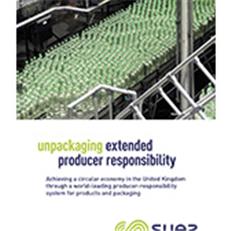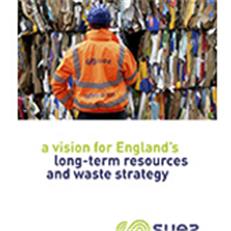Circular economy
SUEZ hosts value chain workshops to inform resources and waste strategy
Leading experts from government, businesses and local authorities debated a circular economy approach to resources and waste strategy in the UK at a recent series of in-depth workshops organised by SUEZ recycling and recovery UK.
The events follow publication of SUEZ’s 100-page ‘manifesto’ for resource productivity published in late May titled ‘A vision for England’s long-term resources and waste strategy’. Combined, it represents a significant effort by the value chain to help government develop a comprehensive sector strategy that SUEZ believes could see £9 billion added to the UK economy.
The company sponsored four workshops, three in London and one in Leeds, which were attended by more than 50 representatives of the value chain – from the Department for the Environment, Food, and Rural Affairs (Defra) to leading business, such as Coca-Cola European Partners, Rolls-Royce, Iceland, Nestle and the Co-op. A range of Local Authorities and sector organisations, including Vaklpak, the Chartered Institution of Wastes Management (CIWM) and the Environmental Services Association (ESA) were also present, together with consultancies such as Eunomia, SLR and Oakdene Hollins.
They took place as Defra develops its resources and waste strategy, which is expected to seek greater responsibility from producers in general and address public concern over plastic packaging in particular. This could include deposit return schemes (DRS), a requirement for greater recyclability and more use of recycled materials in new products.
While the workshop discussions took place under Chatham House rules, written summaries of the issues raised will be published in an addendum to SUEZ’s manifesto later in the Autumn. A brief summary of the themes is included below.
The manifesto was written by Stuart Hayward-Higham, SUEZ’s Technical Development Director, who also led the workshops. He said it was “truly refreshing” to see how all the participants engaged with the issues.
He said: “Throughout the workshops, all of the participants were very forthcoming and willing to contribute to the debate, which stimulated many good ideas. Aside from our own individual interests, all of the delegates appeared to have a common passion about wanting to do the right thing.”
“Bringing the value chain together and seeing how it can collaborate proved to me that there is no reason why the waste and resources plan should not be truly ambitious and that we can be confident that the value chain can come together to help deliver this.”
Workshop 1 considered the importance of having robust data to set targets throughout value chains – and how the current weight-based metric can be improved by using alternative measures.
Workshop 2 considered how manufacturers, businesses, local authorities and recyclers can collaborate better under ‘duty of care’ and ‘extended producer responsibility (EPR)’ requirements to develop smarter partnerships to retrieve more household and commercial waste.
Workshop 3 considered the principle of ‘full cost recovery’ whereby producers of products contribute more towards the collection and recycling of their own products become waste and take greater ownership of the system, driving a better value chain approach from design of products through to their ultimate fate.
Workshop 4 considered the whole life of products and how EPR and DRS could work across materials or for specific products. It also discussed how businesses which embraced resource efficiency and sustainability would be rewarded more than those that did not.
The company sponsored four workshops, three in London and one in Leeds, which were attended by more than 50 representatives of the value chain – from the Department for the Environment, Food, and Rural Affairs (Defra) to leading business, such as Coca-Cola European Partners, Rolls-Royce, Iceland, Nestle and the Co-op. A range of Local Authorities and sector organisations, including Vaklpak, the Chartered Institution of Wastes Management (CIWM) and the Environmental Services Association (ESA) were also present, together with consultancies such as Eunomia, SLR and Oakdene Hollins.
They took place as Defra develops its resources and waste strategy, which is expected to seek greater responsibility from producers in general and address public concern over plastic packaging in particular. This could include deposit return schemes (DRS), a requirement for greater recyclability and more use of recycled materials in new products.
While the workshop discussions took place under Chatham House rules, written summaries of the issues raised will be published in an addendum to SUEZ’s manifesto later in the Autumn. A brief summary of the themes is included below.
The manifesto was written by Stuart Hayward-Higham, SUEZ’s Technical Development Director, who also led the workshops. He said it was “truly refreshing” to see how all the participants engaged with the issues.
He said: “Throughout the workshops, all of the participants were very forthcoming and willing to contribute to the debate, which stimulated many good ideas. Aside from our own individual interests, all of the delegates appeared to have a common passion about wanting to do the right thing.”
“Bringing the value chain together and seeing how it can collaborate proved to me that there is no reason why the waste and resources plan should not be truly ambitious and that we can be confident that the value chain can come together to help deliver this.”
Workshop 1 considered the importance of having robust data to set targets throughout value chains – and how the current weight-based metric can be improved by using alternative measures.
Workshop 2 considered how manufacturers, businesses, local authorities and recyclers can collaborate better under ‘duty of care’ and ‘extended producer responsibility (EPR)’ requirements to develop smarter partnerships to retrieve more household and commercial waste.
Workshop 3 considered the principle of ‘full cost recovery’ whereby producers of products contribute more towards the collection and recycling of their own products become waste and take greater ownership of the system, driving a better value chain approach from design of products through to their ultimate fate.
Workshop 4 considered the whole life of products and how EPR and DRS could work across materials or for specific products. It also discussed how businesses which embraced resource efficiency and sustainability would be rewarded more than those that did not.
Keywords
Recycling and recovery
Report | Unpackaging extended producer responsibility

